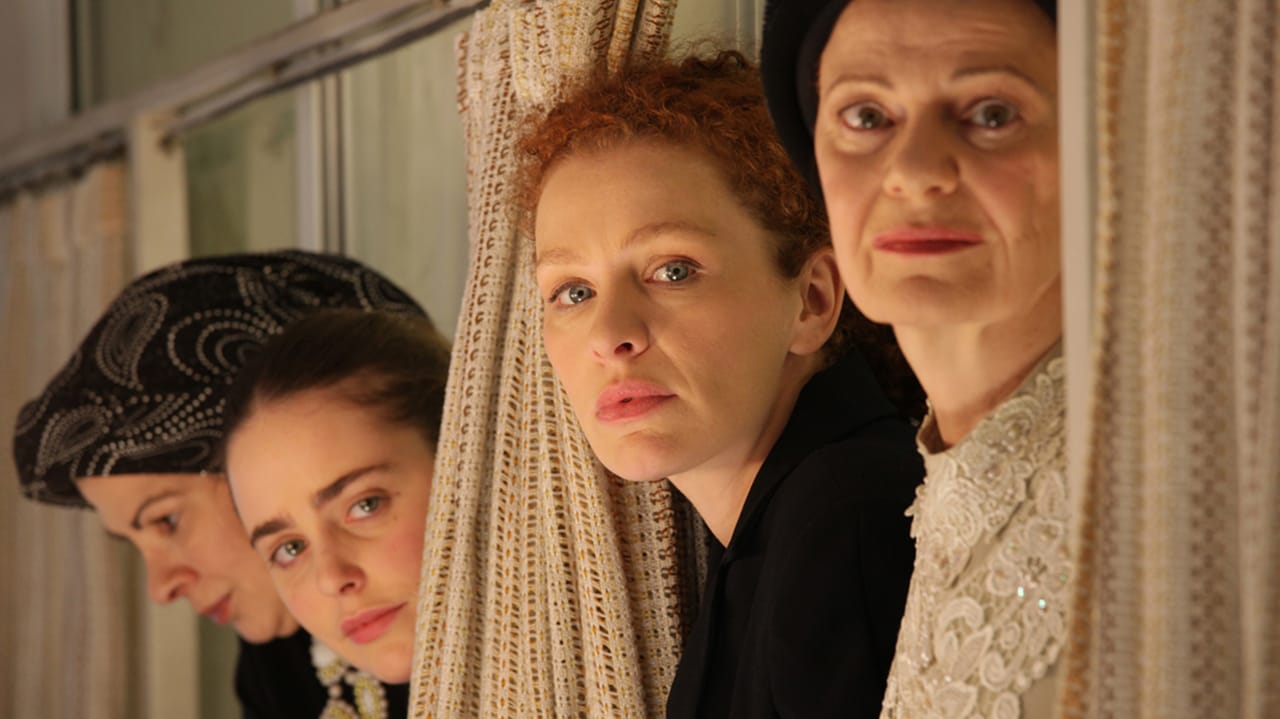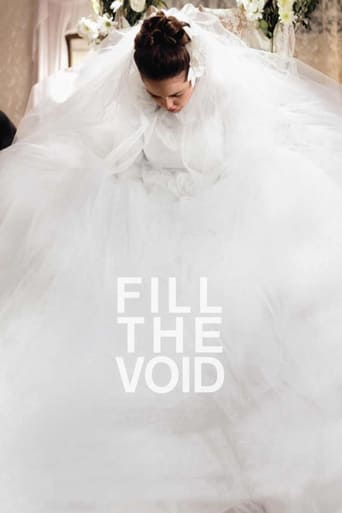Actuakers
One of my all time favorites.
Payno
I think this is a new genre that they're all sort of working their way through it and haven't got all the kinks worked out yet but it's a genre that works for me.
Marva-nova
Amazing worth wacthing. So good. Biased but well made with many good points.
Catherina
If you're interested in the topic at hand, you should just watch it and judge yourself because the reviews have gone very biased by people that didn't even watch it and just hate (or love) the creator. I liked it, it was well written, narrated, and directed and it was about a topic that interests me.
betterforever128
Except for the Jewish law that says a man is not allowed to marry 2 sisters (which Shira does point out when the match is suggested, but is never addressed further. Maybe he just can't marry two living sisters?), it is a perfect picture. The insight, the mannerisms, the process and procedure, but especially the acting. The furtive staring at the Sabbath table, the awkward passing of the baby. The actions of every day Chassidic life display the characters deep feelings, completely forbidden overt expression and and yet all encompassing shared meaning. Spoilers start here. I think the film takes a very healthy position and respect for the question a woman's role in Chassidic society. I see the mother (Rivka) as very pushy and in control of everything in the house. She makes all the decisions and does not need to consult with her husband before making big moves. Shira is given many choices and her opinion is respected. Her mother pressures her as many mothers would but her father, aunt, and rabbi all recommend she make her own choice. Shira fails to define her own needs until after a failed secondary match. She discovers her own desire, and the value of her own feelings, which she was not in touch with when her first match was suggested. I don't think she is passive or pressured. I think she matures and grows as a character as the movie progresses. She learns that what she needs is not just a random bochur (boy) to be her husband but someone she really cares about.As to the title, although Shira does end up filling the void in everyone's lives, Shira also becomes a complete person for herself. This is what the rabbi was referring to when he said she had to be honest and understand her emotions when he initially rejected the idea of her marrying Yochay. It is what she went on to express to her date whom she rejected on the grounds of needing to establish a home of honesty and truth. And being true to herself is how Yochay eventually convinced her to marry him. The way the story is told reminds me of the realism of Russian literature. A story of meaning and feeling implied by actions and intensity often in contradiction to the words being used. p.s.After reading all of the other reviews I have noticed a couple of regular misunderstandings. First the guy she has a date with after Yochay is not the boy from the grocery store who turned her down initially. Secondly Frieda and the other red head are not Shira's sisters.
l_rawjalaurence
Set in an orthodox Hasidic Jewish community in Tel Aviv, FILL THE VOID centers around eighteen-year-old Shira's (Haldas Yaron), decision about whether to marry widower Yochay (Yiftach Klein) or not. Yochay was already married to her sister Esther (Renana Raz), but sadly Esther passed away during childbirth. The title sums up the film's principal theme: by following her family's fishes, Shira will fill the void created by Esther's passing, and hence become a good mother to Esther and Yochay's newly-born son Mordecai. Morally speaking, she believes she is doing the right thing by accepting Yochay's offer, but director Rama Burshtein asks us to reflect on whether the decision will fill the void in Shira's life, or simply deepen it. Issues of love never seem to enter Shira's mind; she believes she is obliged to marry, and hence works hard to persuade the rabbi (Melech Thal) to sanction her decision. The film is tightly constructed as a series of close-ups and two-shots: the camera gives us a unique insight into Shira's turbulent state of mind, as she sits opposite Yochay, her head bowed, her lip quivering as she tries her best to maintain a facade of calm. Her family offer her a limited amount of support, but it's clear that they are forcing her into marriage. The only way she can obtain succor is to pray to God: in one sequence she is photographed from above, her eyes staring into the camera, as she tries to listen to His word. The ending is quite achingly poignant; in her wedding dress, Shira looks stunningly beautiful, but she cannot sit still. Her body repeatedly rocks from left to right, almost as if she is trying to lull herself into a trance- like state to cope with her forthcoming ordeal. Burshtein cuts to the wedding ceremony, where her head is covered with a white sheet; she is quite literally blinded to what follows, while the families celebrate. The film ends with the now-married couple alone after the ceremony has concluded. They stand at either end of the room and Shira stares blankly into space, underlining the irony inherent in the film's title. A low-key film, but totally compelling nonetheless.
chocological
Put aside what you think you know or don't know about the inner world of an orthodox Chassidic community in Tel Aviv, and let Rama Burshtein weave a story that is believable, engrossing, and rich with nuance and subtlety... the timeless themes found in a community which lives in the past, the excellent acting, direction and casting, will have you quickly absorbed in this terrific film.If you are looking to vent your critique or holier than thou judgments of Jewish Orthodoxy, you may feel a bit humbled by the humanity found behind the long dresses, black robes and covered heads. The portrayal of the rabbi is an especially tender reflection of some one who is indeed spiritual, in the most human sense.
Nozz
In this movie an eighteen-year-old girl, living in an Orthodox Jewish environment, has to make a fateful decision while surrounded with uncertainty-- not only about the consequences of her decision but also about the limits, both outside herself and within herself, on her freedom of action. The movie focuses prominently on her not only figuratively but literally. Her pale, round, expressive face fills the foreground again and again, against the background of brownish interiors and black-clothed men, and it's not a face the viewer gets tired of, nor does it turn her predictable. There are surprises in her behavior, and the audience accepts them. Not so with her male counterpart; when his emotional scene came, I'm sorry to report there were people in the audience who laughed. The movie hadn't made the necessary prior investment in sympathy for him. But to the extent that it belongs to Hadas Yaron as an actress and a photographic subject, it's well worth watching-- and it knows it is; it gives the audience plenty of time to appreciate each shot.

